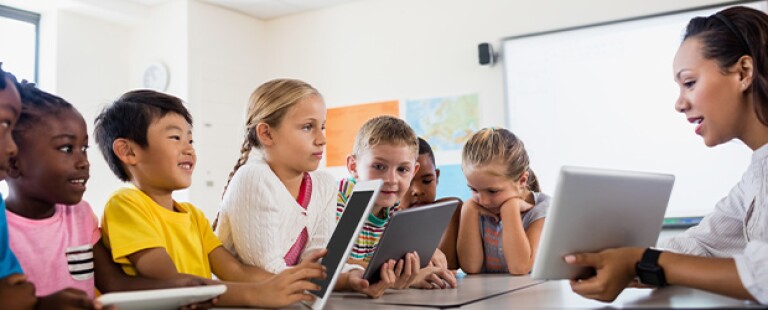Affordable Primary Science Tuition Singapore for All Learning Needs
Affordable Primary Science Tuition Singapore for All Learning Needs
Blog Article
Discover the Vital Advantages of Recognizing Primary Science for Young Students
The significance of key science education and learning for young students extends much past plain knowledge procurement; it functions as a basic pillar in establishing important abilities such as vital reasoning, problem-solving, and creative thinking. Engaging with scientific principles via interactive and inquiry-based activities not only cultivates curiosity but likewise prepares for resistant, confident learners. As we explore these benefits further, it comes to be clear that the ramifications for future academic and personal development are profound. However, what certain strategies can instructors utilize to make best use of these advantages?
Enhancing Important Thinking Abilities
Cultivating critical believing abilities in young students is vital for their cognitive growth and future scholastic success. Vital reasoning allows youngsters to analyze details, review proof, and make informed decisions, which are crucial skills in today's information-rich culture. By taking part in clinical query, young students can improve these abilities as they check out ideas with monitoring, thinking, and experimentation.
In key science education and learning, instructors can facilitate essential thinking by motivating pupils to ask concerns, formulate hypotheses, and perform experiments. This hands-on method allows children to practice analytic and establish rational thinking abilities. For instance, when trainees examine the homes of materials or the concepts of movement, they learn to examine their findings critically and reason based upon proof.
In addition, discussions and collective jobs can advertise vital reasoning by providing possibilities for learners to express their ideas, obstacle presumptions, and think about diverse point of views. By creating a helpful environment that values questions and reflection, educators can nurture important believing skills that equip young students to become long-lasting learners and independent thinkers. Eventually, boosting these skills lays a durable foundation for their future scholastic endeavors and personal growth.
Fostering Inquisitiveness and Exploration

Main science education and learning provides a structured environment where young students can check out different phenomena with hands-on experiments and monitorings. By enabling them to connect with materials and involve in inquiry-based discovering, teachers create possibilities for youngsters to develop theories, test their concepts, and draw conclusions. Such experiences support a feeling of wonder and exhilaration regarding science.

Structure Self-confidence in Trouble Addressing
Building confidence in analytic is an important element of main science education that encourages young students to approach difficulties with resilience and imagination - primary science tuition Singapore. When kids are encouraged to involve with clinical ideas with hands-on activities and inquiry-based knowing, they create essential skills in essential thinking and analysis. This procedure not just boosts their understanding of clinical principles yet likewise cultivates a sense of ownership over their understanding
To develop self-confidence, teachers must create a helpful atmosphere where mistakes are deemed opportunities for development as opposed to failings. This encourages trainees to take dangers and discover different remedies to problems. By providing scaffolding and advice, instructors can aid students navigate complicated tasks, gradually boosting their freedom in problem-solving situations.
Furthermore, collective discovering experiences, such as team jobs or experiments, can further improve pupils' confidence as they learn to articulate their ideas and listen to others' perspectives. These communications nurture social skills and strengthen the idea that problem-solving is usually a cumulative venture. Eventually, cultivating confidence in problem-solving prepares young learners for future academic difficulties and outfits them with the tools needed for lifelong discovering.
Motivating Creative Thinking and Advancement
In the realm of main scientific research education, motivating creative thinking and development is important for cultivating a dynamic learning environment. By fostering a society where young learners can discover ideas and experiment look at these guys easily, educators assist pupils establish critical believing skills and a passion for exploration. Creativity in science encourages youngsters to ask inquiries, devise hypotheses, and involve in hands-on tasks that promote their creativity.
Integrating flexible projects and inquiry-based learning right into the educational program allows pupils to share their unique point of views and options. When tasked with addressing a problem relevant to their atmosphere, trainees can brainstorm multiple strategies, leading to creative end results that display their creativity. This not just deepens their understanding of scientific principles but also instills a sense of ownership over their understanding procedure.
Furthermore, innovative scientific research education nurtures cooperation amongst peers, as students typically share concepts and construct on one an additional's insights - primary science tuition Singapore. This collective spirit advertises not just advancement but additionally essential social abilities. Hence, by focusing on imagination and development in main scientific research education, we equip young learners to think critically, welcome challenges, and picture opportunities, laying a solid structure for lifelong knowing and expedition
Preparing for Future Discovering Challenges
Young learners' ability to navigate future discovering challenges rests on a strong foundation in key scientific research education and learning. This fundamental understanding equips trainees with crucial believing skills and an organized strategy to analytical, vital for taking on complex problems in an ever-evolving globe. Main scientific research cultivates inquiry-based understanding, urging trainees to ask inquiries, explore hypotheses, and participate in hands-on experiments.
As they create these skills, students end up being skilled at examining data, acknowledging patterns, and attracting notified verdicts. Such competencies are vital not just in clinical areas but likewise in innovation, engineering, and mathematics (STEM), where interdisciplinary expertise is progressively important.
In addition, primary scientific research education cultivates a sense of curiosity and resilience in young learners, enabling them to view obstacles as possibilities for growth. As they come across and overcome obstacles in their scientific explorations, they build self-confidence in their capability to adjust and introduce.
Eventually, a strong foundation in key scientific research not only prepares young learners for academic searches yet additionally equips them with the devices click to find out more required for lifelong learning and versatility go to website in a rapidly changing international landscape. By purchasing main science education, we are buying the future potential of our students.
Final Thought
Comprehending key science is vital for young learners, as it promotes important reasoning, curiosity, and imagination. Involving with scientific concepts through hands-on experiments develops and improves analytic capacities resilience. This foundational expertise not just gears up pupils to analyze information and recognize patterns yet additionally nurtures an inquiry-based way of thinking. Inevitably, the advantages of key scientific research education prepare kids for future scholastic pursuits and impart lifelong discovering practices important for growing in an ever-evolving world.
The value of main scientific research education and learning for young learners prolongs far past simple knowledge procurement; it offers as a basic column in developing important abilities such as vital reasoning, analytical, and imagination. By developing a helpful setting that values query and representation, teachers can support vital believing abilities that encourage young students to end up being independent thinkers and lifelong students. Therefore, by focusing on creativity and innovation in main science education, we equip young students to think seriously, embrace challenges, and visualize opportunities, laying a solid foundation for lifelong discovering and expedition.
Young learners' capacity to browse future understanding obstacles pivots on a solid foundation in primary science education.Comprehending main scientific research is vital for young students, as it promotes important thinking, inquisitiveness, and imagination.
Report this page